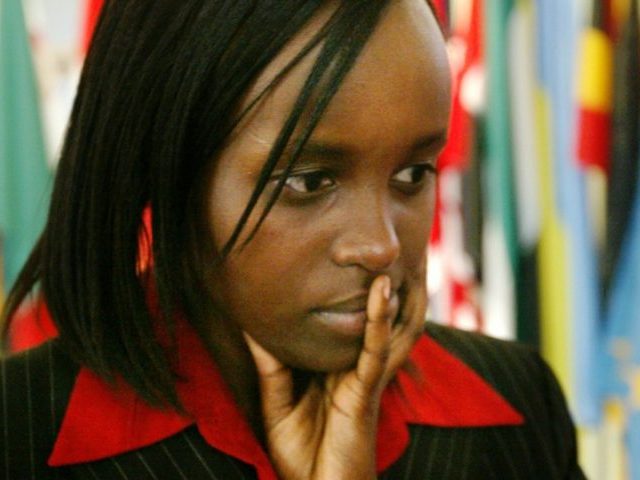WASHINGTON, DC — Jacqueline Murekatete did not expect to find her life’s work as a nine-year-old in Rwanda in 1994, when as many as one million people — including her entire family — were murdered in the span of about 100 days.
But her participation in a discussion about the genocide at the Rwandan Embassy in Washington, DC, on Friday continues her lifelong work to educate people about the atrocity and to help survivors.
“While it’s important to commemorate and remember the victims … we must actually remember the victims of past genocides in an effort to prevent future genocides,” Murekatete said.
Murekatete recounted that she was nine years old when the genocide began.
“I went from being a happy child with parents, six siblings, with a large extended family and friends, to being a traumatized orphan who lost not only her innocence because of the horrors I witnessed but also lost my entire immediate family and most of my extended family,” Murekatete said.
“I learned during the genocide my Hutu neighbors — the same neighbors whose children I grew up playing with, the same group of neighbors who used to come to my family home for food and drink, the same group of neighbors who used to attend the same churches … These same people had taken my parents and all my six siblings to a nearby river where they proceeded to murder them one by one and throw their bodies in the river,” Murekatete said. “Our families had been murdered not because they were criminals, not because they were soldiers in the war, but simply because they were … Tutsis.”
“The Tutsi ethnicity was a crime deserving of death,” Murekatete said.
Murekatete spoke at length about how genocide is preventable because of the conditions that lead up to it, which can serve as signals and warnings and afford people the opportunity to take action before the genocide takes place.
“People don’t get up one day and want to attack their neighbors and butcher their neighbors,” Murekatete said.
Instead, the Rwandan genocide came after “years of discrimination against Tutsis” and “a dehumanization campaign which portrayed Tutsis not as human beings but as snakes and cockroaches that needed to be exterminated.”
The genocide also unfolded because the international community, including the United States and the United Nations, failed to intervene.
“It was simply a lack of political will to stop the genocide,” Murekatete said.
And on the 25th anniversary, she said, people have to not only remember and commemorate but to do the work required to prevent other genocides that have very real and long-lasting consequences.
“That over a million number is not just a faceless statistic,” Murekatete said. “That number represents our fathers, our mothers, our brothers, our sisters, grandparents, uncles, cousins, friends, teachers, neighbors — people who meant the world to us and whose lives were really cut short by the genocide.”
“Even though it’s been 25 years, for those of us who lived through the genocide, the horrors we witnessed are still very vivid and the loss that we suffered remains an indelible part of our lives,” Murekatete said, quoting another on the effects of this kind of atrocity.
Zachary Kaufman, law lecturer and fellow at Stanford Law School and editor of After Genocide: Transitional Justice, Post-Conflict Reconstruction, and Reconciliation in Rwanda and Beyond, also spoke at the event and listed ten lessons that should be learned:
- Hate speech is dangerous.
- Atrocity prevention is possible.
- Employ transitional justice, including criminal prosecutions, truth commissions, reparations programs, and various kinds of institutional reforms.
- Women’s rights are critical to protecting them from war crimes such as sexual assault.
- Women’s participation in government and in developing strategies will help to prevent genocides and help survivors of past genocides.
- Genocide education is needed.
- The political will of the international community prevents future genocides.
- Support survivors.
- ‘Never again’ should be more than a slogan but a road map on incorporating all of the other lessons learned going forward to prevent future genocides.
Kaufman noted President Donald Trump signed bipartisan genocide prevention legislation into law earlier this year, which was named in the honor of Holocaust survivor and Nobel Prize laureate Elie Wiesel.
Jewish News reported:
The Elie Wiesel Genocide and Atrocities Prevention Act, introduced by Congressman Joe Crowley (D-N.Y.) and Ann Wagner (R-Mo.), and Sens. Ben Cardin (D-Md.) and Todd Young (R-Ind.) makes the prevention of genocide and other crimes a matter of national security, and aims to improve and increase the U.S. response to potential and emerging genocides.
It establishes a Mass Atrocities Task Force to provide training to U.S. Foreign Service officers on detecting early signs of atrocities and will mandate the director of national intelligence to report on atrocities in an annual crime report to Congress.
Murekatete’s work as a survivor and advocate includes founding the Genocide Survivors Foundation.
Follow Penny Starr on Twitter.

COMMENTS
Please let us know if you're having issues with commenting.